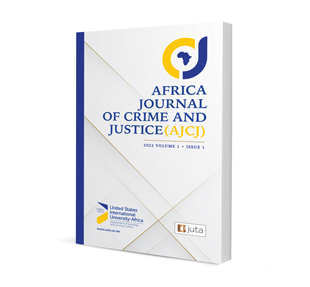
Victimisation and the Fear of Cybercrime during the COVID-19 Pandemic: Experience of Undergraduate Students in Kenya
Authors: Anthony Kahuthia Weru and Peterson Mwai Kariuki
ISSN: 2958-8162
Affiliations: Institute of Criminology, Forensics and Security Studies, Dedan Kimathi University of Technology; Institute of Criminology, Forensics and Security Studies, Dedan Kimathi University of Technology
Source: Africa Journal of Crime and Justice 2022, p. 99 – 125
https://doi.org/10.47348/AJCJ/2022/a5
Abstract
The victimisation model in the context of cyberspace suggests that previous cybercrime victimisation results in fear of cybercrime. Previous researchers have found mixed results in their findings. The current study uses five prevalent cybercrimes in Kenya, namely, impersonation, cyberbullying, online fraud, phishing, and computer virus, to establish the nature of the relationship between victimisation and the fear of cybercrime. A convenient sample of 55 university students pursuing a Bachelor’s degree in criminology at Dedan Kimathi University of Technology was used. Findings indicated that those who have experienced cyberbullying and impersonation and those who spend much time on social media are more fearful of cyberbullying. Moreover, those who have experienced online fraud and those who are less frequent shoppers are more fearful of online fraud, while those who have experienced phishing and those who receive a high number of spam emails are more fearful of hacking when opening links embedded in emails. Finally, those who have experienced computer viruses, as well as those who complete zero downloads per day, are more fearful of computer viruses. High internet usage, experiences of online fraud and phishing attacks and attempts which are positively related to fear of cyberbullying, can be attributed to COVID-19 times when most Kenyans were vulnerable and not working.